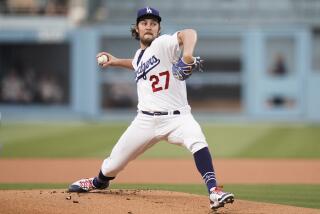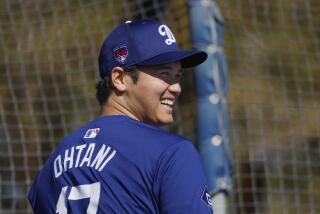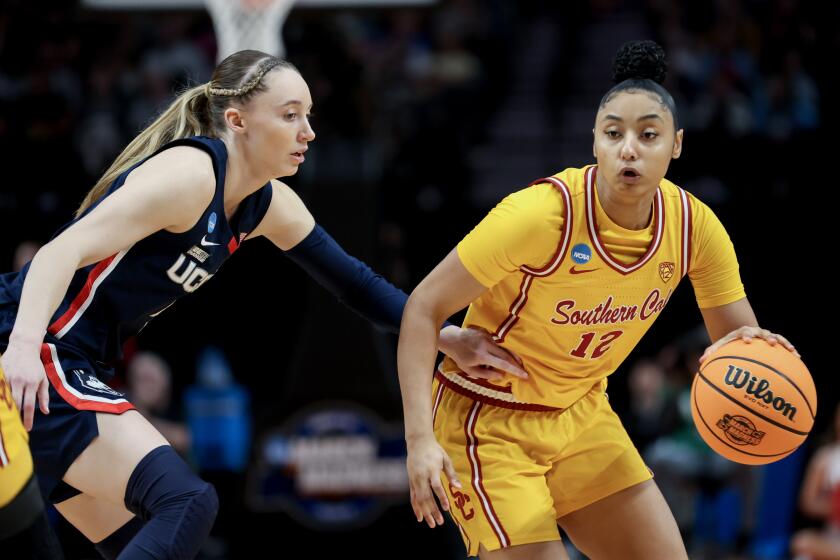He’s No Mr. Nice Guy : Cleveland Slugger Albert Belle Relishes That Role, but His Surly Attitude Makes Him a Public Relations Nightmare
LAS VEGAS, Nev. — Albert Belle wants a puff piece. He is being interviewed on a condition: no “negatives.” There are to be no questions about, ahem, problems and incidents. No mention of lawsuits, suspensions, reprimands, dark moods and deep anger. Nothing, in short, about the gritty substance of Albert Belle’s character.
“I’m tired of seeing negative stuff,” Belle says. “I’m sure everybody else is. Enough negative stuff has been said.”
Right. And who am I to argue with Belle as he assaults four pieces of fried chicken and a baked potato? We are at a Las Vegas casino cafe early in February. Twice he has asked if I am expensing the meal and twice I have assured him. No reason to spoil his dinner, and risk a scene, by dwelling on negatives. Indeed, I am compelled to write something nice and here it is:
Albert Belle has a good appetite. Carrion birds do not pick bones as clean. His enjoyment of a potato is so pure, he doesn’t bother with fork and knife. Well-mannered Cleveland writers might interpret this as a violation of Amy Vanderbilt; I see it as a lusty zest for life.
Another nicety: Belle is so good he will break Roger Maris’ single-season home run record this year, the 35th anniversary of No. 61.
“Weren’t you at the World Series?” he asks.
“Yes.”
“I remember your face. I don’t remember names, but I remember faces.”
Inasmuch as 1,000 reporters cover a World Series, Belle’s memory serves him well. But I hasten to remind him of our first meeting. During the American League Championship Series, I approached his cubicle in the Indians clubhouse. He was pulling on socks and stirrups. I stood next to him for 30 seconds; he did not look up. Finally, he said, “I don’t like people standing over me. You better get the bleep away.” He never saw my face.
“You probably remember my shoes,” I say. “I’m wearing the same shoes.”
Belle chuckles.
“Oh, yeah,” he says. “I thought I recognized your shoes.”
The Sultan of Surly has a sense of humor. He likes to tease, and he can appreciate his own caricatured image as a hulking tough. During a photo session with photographer Todd Bigelow, he grinned, momentarily. “Careful, you’ll ruin your image,” I said. He reverted to character, screwing his face into a hard slate. I thought I heard him growl.
Belle’s sense of his own menace reminds me of Sonny Liston, a former heavyweight champion, knockout artist and bully. Historian Bert Randolph Sugar writes of Liston: “For all his raw power and size, Liston’s most remarkable attribute was psychological rather than physical. He made a science out of inspiring fear in the hearts and minds of his opponents, breaking their wills with a stony stare during the referee’s instructions, and stuffing towels under his robe to make his enormous physique look even bigger and more intimidating. In short, he was ‘the meanest mother---- on the block, and not only didn’t he care who knew it, he wanted everyone to know it.”’
Belle is baseball’s version of heavyweight champion -- home run king. He hit 50 last season -- in a 144-game schedule, mind you -- and four more in the postseason. Simply, he scares the hell out of pitchers. They see what Liston’s opponents used to see: angry malevolence. Belle’s Bluto-like torso, at 6-2, 210 pounds, is built to punish. A muscular furrow runs across his forehead. Dark eyes speak a language of domination -- particularly when they are fixed on dinner.
“I would be intimidated if I’m a pitcher,” I say. “Do you encourage that?”
“I think I have the pitcher thinking that when I come up he better have his best stuff,” Belle says. “He may get me once, he may get me twice. But sooner or later, I’ll get him. Maybe not this year, but next year. He knows as soon as he makes a mistake, he’s in a lot of trouble.”
He cites the example of Toronto Blue Jays right-hander Juan Guzman, a dominant starter until suffering a sore arm two seasons ago. When Guzman was healthy, Belle says, he had “a killer instinct, the eye of a tiger.” After his arm went bad, his eyes were furtive, afraid.
“Do they avoid eye contact?” I ask.
“Some do,” he says. “Some just look at the catcher.”
Boxers stare down one another when receiving a referee’s instructions, I point out. Belle acknowledges the similarity.
“Some (boxers) don’t like to look at the other guy,” he says. “Some try to intimidate the other guy. Some guys are pretty confident. They’ve been training hard, so they’re going to come out with their best stuff.
“The way I look at it, a pitcher always is going to come out with his best stuff. I anticipate that so I will be ready for him.”
Simply put, Belle comes to the plate ready to rumble.
*
An idea is occurring to Belle, like a green tendril pushing through a crack in cement. He is thinking there may be no gain in being baseball’s Sonny Liston. Nice guys get product-endorsement deals, win MVP awards, become Franchise players. Junior Griffey, Frank Thomas and Mo Vaughn are nice guys. Belle is toying with the notion of acquiring a new image -- Sunshine Albert -- as he might a chic spring wardrobe. Which he needs.
To be sure, Belle is smart enough to know a genuine personality makeover is difficult, possibly painful. But that’s not a problem. “Albert doesn’t need to change his personality; he needs to change his image,” says Terry Belle, his twin brother and advisor. Perception is reality in show business. Why change personality when he can get what he wants by changing image?
“I am concerned there is a lot of negative publicity about Albert Belle, and a lot of positive things I do haven’t been brought to the surface,” Albert says. “Maybe it’s my fault for not being accessible to the media. So I guess I’m going to work on changing my image.
“Look at Dennis Rodman. He was a bad guy until Michael Jordan said he was OK. Now everybody says he’s OK.”
“That’s only as long as he shows up, does the job, and they win,” I say.
“Well,” Belle says, “that’s what I do.”
“True. But you don’t have Michael Jordan.”
He feigns discouragement.
“That’s right. I need Michael Jordan. Maybe he’ll come back to baseball.”
“I have an impression you enjoy your Bad Boy image.”
Belle wipes his mouth with a napkin. He sips from a glass of juice and glances around to see if anybody is approaching; nobody is. He lowers his voice.
“It has its advantages,” he says. “People stay away from you. I have a tendency to keep people at a distance. That’s my personality. Only a few people are really friends. A lot of time I really don’t trust people. Because of things that happened in the past, I don’t trust a lot of people. I keep my guard up.”
Bottom line, Albert Belle isn’t sure he wants another image.
*
Belle is golfing with a friend, Len Spacek, a Cleveland-based oil merchant. The two make an odd couple, on a chill desert afternoon, Belle 29 and black, Spacek 51 and white, competing furiously at a $2 skins game. Predictably, Belle hits long off the tee, about 280 yards. He tends to push his drives, similar to his World Series homer against Greg Maddux. The context, remember, was that Maddux had stoned the Indians on two hits in Game 1. Facing elimination in Game 5, Belle came up in the first inning, two outs, one on. He crowded the plate, reached outside on the first pitch and faded one into the visiting bullpen -- Indians, 2-0.
The home run was a stunning refutation of Maddux’s supposed invincibility, mano y mano, prime time, championship bout. Every scouting report in the National League, from now on, is going to say: “Crowd the plate on Maddux. Don’t give him the outer edge. He’s from Las Vegas -- call his bluff.”
If not for Tom Glavine’s Game 6 mastery, it might have stayed with them.
The Braves were smart about Belle. They walked him seven times; he finished 4 for 17 with two homers (another opposite-field shot, off left-hander Steve Avery in Game 4, sixth inning, knotting the score at 1). He credits Braves scouts for a clever plan.
“Two things,” he says. “They defensed us real well. And they kept the ball out of our strength. I was ahead a lot in the count. They just wouldn’t give in to me.”
After the Series, Belle retreated to Las Vegas, losing himself in golf. Little of his baseball persona -- high focus, anger, tension -- is evident on a golf course. I expect him to wrap a club around a tree, or chase somebody in his cart, but his most despicable act is forcing Spacek to putt out a gimme.
“Everybody thinks that,” he says. “But they don’t know the real me. I don’t have to make a living doing this. If I had to play scratch golf it might be different.”
“Is baseball stressful?”
“It can be if you let it get to you. I know a lot of times I don’t look like I’m relaxed or enjoying the game, but I am. I don’t walk around with a smile on my face 24 hours a day, because I have high expectations of myself and my teammates and the organization when I step on the field. But it can be stressful. When you’re not producing and winning, it can be real stressful.”
*
During the season, Belle rarely does interviews, avoiding informal conversations that fill newspapers and sportscasts and keep players in touch with fans. He says interviews break his routine and focus, suggesting -- with tongue half in cheek -- that baseball writers use interviews as a crutch because they don’t watch the game.
“That’s because they’re eating hot dogs and drinking beer,” he says. “What we got to do is kill that spread upstairs. No food, no beer. Makes them fat.”
“So why do you interview in the offseason?”
“You get some good meals. If you do them during the season, by the offseason nobody wants to talk to you.”
Pinpointing the root of Belle’s mistrust is speculative. He mentions a story, written in 1992 by a national publication, in which he believes a writer deceived him. A more likely cause is the uncomfortable realization that, as a public figure, he is the sum of his history. Belle would like to reinvent himself -- with emphasis on religious and family values from a middle-class Shreveport, La., upbringing -- and wipe away the, ahem, problems and incidents of his past. Yet somehow, he keeps reinventing himself as himself -- disdaining the courtesy and respectfulness taught him by his parents, both retired educators. Media hold up an unpleasant mirror.
“You cost yourself the MVP,” I say.
Belle doesn’t dispute this. Boston’s Mo Vaughn narrowly edged him for the 1995 award voted by the Baseball Writers’ Association of America; several writers said Belle’s attitude swayed their vote. He suggests his relationship with writers should be irrelevant.
“You should look at strictly statistics,” he says. “Look at what a guy does on the field, not off the field or after or before the game. What he does first pitch to last out.”
“Writers are human,” I say.
No response. Radical ideas require time.
Dessert is a banana split, with three scoops and gooey topping.
“Do you keep a diet?” I ask.
“Low-fat,” says Belle, smearing marshmallow sauce across his tongue.
Dessert is about to be served in Belle’s professional life; the fun is just starting. He is negotiating a new contract that will carry him through his prime years and likely be his most lucrative. He wants to stay an Indian; the Indians want him to stay. Money could be a problem if Belle is as hard on Owner Richard Jacobs as on my expense tab. Indians officials expect Belle to draw a bead on Griffey’s recent four-year, $34 million deal. Nobody doubts that Jacobs, swimming in money, could make Belle baseball’s highest-paid player. (The question is: Does Jacobs want to create a structure that will crack under its own weight, or one that can thrive in the reality of the Cleveland market? Problem is, without a labor agreement, Jacobs cannot project the market.)
“If Griffey is worth $8.5 million, what are you worth?” I ask.
“I leave that up to my agent and the Indians,” he says. “What do you think?”
“It’s an interesting question. You have to compare yourself with other players. Is it based on stats, or more than stats?”
He ignores my evasion.
“I’m asking you,” Belle persists.
“If I say you’re worth $34 million, (General Manager) John Hart is going to call me and say, ‘Thanks for spending my money.’ ”
Belle drops a maraschino cherry into his mouth.
“A lot of people have said it.”
Consider these figures: In 249 games over the past two labor-shortened seasons, Belle has more home runs (86) and RBIs (227) than: Griffey (183 games, 57 homers, 132 RBIs), Barry Bonds (256, 70, 185), Frank Thomas (258, 78, 212) and Cecil Fielder (245, 59, 172). Bonds, Thomas and Fielder are in the $7.2-million range. Griffey and Bonds are Gold Glove outfielders, Thomas and Fielder below-average first basemen. Belle is a below-average left fielder. No, I didn’t tell him to his face.
If Belle doesn’t sign, then he will have ample motivation to post big numbers. There is no guarantee he can improve on last season -- he became the first to reach 50-50 (50 home runs and 52 doubles). But again, that was over a 144-game schedule in which he played every game but one. So improvement is conceivable.
According to Terry Belle, Albert speculated recently that he could break Maris’ hallowed and surprisingly little-contested single-season record -- if he hits 30 by the All-Star break. Belle had 14 at the break in 1995. When I remind him of his remarks to Terry, Belle declines to take the bit. His goals, he says, are to win the World Series and stay healthy.
“I make reasonable goals,” he says. “Sixty is a pretty hard goal to attain. But 30 is attainable.”
“How possible is 60?”
“Easy. If you hit 10 home runs a month for six months. Sounds like a piece of cake, doesn’t it?”
In two months last summer, August and September, Belle hit 31 homers, breaking the previous record for most homers in a two-month span, 28, set by Babe Ruth in May-June 1930 and equaled by Maris in June-July 1961. I mention that Ruthian-Marisian pace to suggest to Belle his upper limits. He concedes that the notion of 60 first intrigued him while watching a film biography of Ruth.
“It can be done with a lot of luck,” Belle says. “Somebody is going to hit .400 or break the home run record, but you’ve got to have a lot of luck. Maybe before the turn of the century somebody will do it.”
“Do you know what Roger Maris went through?”
“No.”
I tell him about Maris, a shy and reticent man, being hounded by the New York press corps and jeered by fans of Ruth and of Mickey Mantle, a more popular teammate. Maris’ health suffered; pain gnawed at his stomach. By the time he broke the record on the last day of the 1961 season, his hair was falling out and his eyes were sunken.
“That’s probably because he talked to the media every day,” Belle His mood darkens at the thought of poor Maris oppressed by media. And then it hits me. If Belle challenges 61 and media descend, Sonny Liston will rise from the dead. At least I hope so.
Sunshine Albert is a fine offseason identity, suitable for golf and banana splits. But baseball is overrun with cheerful players eyeing careers in broadcasting. Skulking, glowering home run hitters, on the other hand, are rare. Albert Belle should stay the way he is. He may not always be nice, but he’s never boring.
More to Read
Go beyond the scoreboard
Get the latest on L.A.'s teams in the daily Sports Report newsletter.
You may occasionally receive promotional content from the Los Angeles Times.










